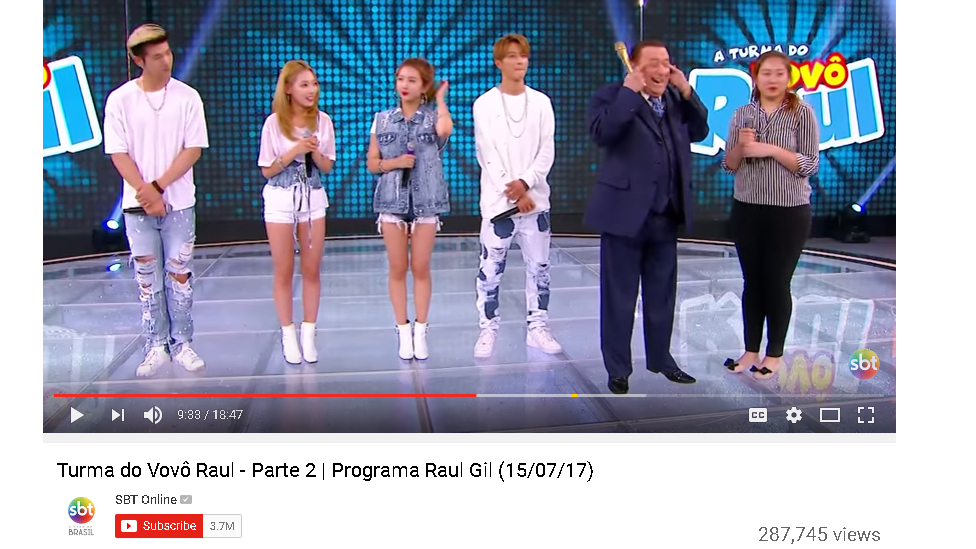TV host's race jokes spark Brazil-Korea online war
- Published

Brazilian TV host Raul Gil came under fire for making a "slant eye" gesture while interviewing Korean pop group KARD
South Koreans and Brazilians have become embroiled in an online battle after racially insensitive comments and gestures were made on air by a popular TV host.
The spat began when the South Korean K-pop group KARD appeared on a TV show presented by well-known Brazilian personality Raul Gil.
Gil began with relatively innocuous banter, asking KARD members if they were single. But when the crowd cheered, he asked why they were reacting in such a way, and made a "slant-eye" gesture.
Later in the programme the host made a related jibe about a Japanese youngster who appeared on his show, telling him that he "had better open his eyes."
Brazil has the largest Japanese population of any country outside of Japan. It's estimated that just under 1.5 million people of Japanese descent live in Brazil out of a total population of more than 200 million. By contrast only about 50,000 people of Korean descent are estimated to be living in Brazil.
The broadcast kicked off a huge reaction in South Korea, where furious users of the web portal Nate sounded off about Gil and Brazil in general.
One person condemned the airing of "xenophobic" and "racist" attitudes, while others attacked the appearance of the TV host and unfavourably compared Brazil's economic situation to Korea's.
"That presenter is so fat... vulgar human" said one. Another commented that Brazil is "much poorer" than Korea, "so why are they insulting us?"
Another referenced Brazil's humiliating 7-1 defeat at the hands of Germany during the 2014 World Cup.
Brazil strikes back
In response to the backlash, the hashtag "Do you want Korea" began trending on Twitter. Picked up mainly by Portuguese-speaking social media users, it has since been used more than 400,000 times.
Messages unfavourably compared Korea to Brazil and pointed out instances of alleged Korean racism.
One user suggested that Koreans prefer lighter skin tones, while others made references to the use of black face on Korean TV. In April 2017, a South Korean TV station apologised, external after a comedy show featured a character in blackface.
![A picture of a woman getting a bucket of white paint dumped on her. The caption, in Portuguese, says: 'Korea: Brazil is a racist country. [But] when a celebrity who is tanned visits Korea ... '.](https://ichef.bbci.co.uk/ace/standard/976/cpsprodpb/C821/production/_97033215_doyouwantkorearacismtweet.png)
Translation: 'Korea: Brazil is a racist country. [But] when a celebrity who is tanned visits Korea ... '.
One of the first people to use the hashtag, Ana Luiza, told BBC Trending that the hashtag was driven by Brazilian fans of "K-pop"- the music genre which originates in South Korea.
"We obviously know that Korea is no flower," she told Trending. "[In Korea there is] blackface on TV, and mixed-race people suffer prejudice. They wanted to spread their prejudice, so we decided to retaliate in a comical way."
She added: "We didn't expect it to be so big. But Brazilians on the internet are very active, and so is the K-pop community."
You might also like:
One tweet that was retweeted over 3,000 times draws comparisons to a Twitter spat, external that previously took place between Portuguese and Brazilian social media users. It started after a meme went viral in Portugal - but had widely circulated amongst Brazilians the year before.
The tweet, in Portuguese, says: "To pick up a fight with Brazil, you've got to have guts. Just ask Portugal".

Bruno Garcez, a BBC digital editor from Brazil, says it's no surprise that a combative hashtag emerged from the South American country.
"In the past, social media users from Brazil have taken on Portuguese netizens and even the singer Azaelia Banks, who had her Facebook account blocked after it was reported by Brazilian web users," he says. "Organised calls for action often lead to quick responses."
He adds: "The trouble is that even when reacting to an offensive or racist remark, many Brazilian netizens, although often starting on the right side of the argument, frequently lose the plot somewhere along the line and then veer into racist and offensive remarks themselves as well."
Blog by Kayleen Devlin
You can follow BBC Trending on Twitter @BBCtrending, external, and find us on Facebook, external. All our stories are at bbc.com/trending.